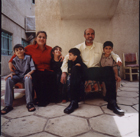
Daily Baghdad 2004
Distributed by First Run/Icarus Films, 32 Court St., 21st Floor, Brooklyn, NY 11201; 800-876-1710
Produced by Romain Goupil
Directed by Romain Goupil
VHS, color, 100 min.
Adult
Middle Eastern Studies, Family Relations
Date Entered: 12/01/2004
Reviewed by Karen MacArthur, Kansas State UniversityDaily Baghdad is a film that follows an ordinary Iraqi family living in Baghdad in February 2004. It is important to note that the film was intended to be partnered with a second similar documentary, scheduled to be filmed in February 2005, which would show the daily life at a different stage after the war. Abbas ad Roubay, a former member of Saddam Hussein’s army turned deliveryman, his wife, Yasamin, and their four young children struggle to survive in a city stricken with blackouts, poverty, damaged infrastructure, and occupation.
This film is divided into four segments, each one focusing on a member of the family. We see them going through their daily routines, including a typical workday, traffic jams, shopping, visiting relatives, helping the children with homework, and family meals. While Abbas and his family are poor, their relations are far better off so we are able to see the differences in the households of each income level, a disparity vividly contrasted by the Roubay family’s lack of toilet or shower while Yasamin’s sister lives in an apartment adorned with mirrors, chandeliers, and a fountain.
Military activities play a background role in this film; only occasionally do we see a military vehicle or a uniformed soldier. In each segment, however, the family members discuss their experiences under Saddam Hussein’s rule and their views of the future. Some express concern for the future and the reliability of promises for aid. As one man states, “All their promises of freedom, aid, and democracy for the people of Iraq – it better not be just a lot of talk.” The views range from Abbas’ pessimistic opinion, “this is a worn down country. It’s just lies and more lies,” and “this is a country without a future” to his brother-in-law’s more cautiously optimistic “I don’t want to lose hope. I want to keep up my spirits.” Dialog of this nature is limited to approximately 10-15 minutes of the film; the majority of the film concentrates on daily activities.
One noticeable feature of conversations related to Saddam Hussein is the editing. For example, in the first segment Abbas and his brother, Ghalib, are discussing their experiences under Hussein’s rule. The conversation we see begins with Ghalib saying, “I was imprisoned for two years in a tiny cell belonging to the secret service. How can you say the situation was better before?” In the third segment Abbas and his brother-in-law, Hilmi, are having a similar discussion. The shown conversation begins with Abbas saying, “I want to have confidence in the future, Hilmi.” Moments later in the same conversation when Hilmi says “You miss Saddam, and you talk about things being unsafe” it isn’t clear if Hilmi is speaking in general terms or if we missed something prior to the shown segment. Referrals to unheard statements made this aspect of the video frustrating – hearing the apparently opposite view might have been interesting.
A minor flaw of the film is that no background or commentary related to religion is provided, although Shiites are part of the imagery and interviews, such as when Abbas says, “Saddam Hussein hated Shiites. He always fought them and neglected them.” Later we see Hilmi watching a Shiite parade and discussing his previous participation in them. Development of this theme if it applies to the Roubay family might have been nice. As it is in the film, it seems to be nothing more than a passing comment.
Sound, color, and video are professional and the subtitles are easy to read. This film is a French production and conversations are spoken in Arabic, French, and English with English subtitles. Goupil creates a very personal feel by sometimes joking with the family and including shots of the children waving at the camera. At other times Abbas tells people, “I’m going to be on French television!” The family never seems to stop noticing the camera crew.
Additional materials may be necessary to supplement the film, including materials related to religion. If the second documentary in February 2005 is indeed created, it would certainly enhance the value of this documentary. This film is recommended for libraries wanting to document family life in Baghdad during this time period.